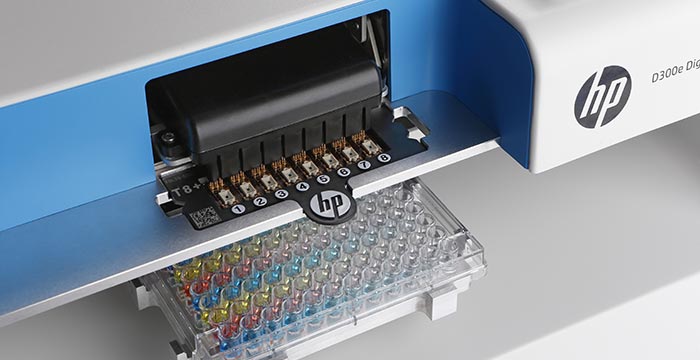Press release from the issuing company
HP Inc. announced the deployment of HP D300e BioPrinters, associated supply cassettes, and training, free of charge, to research laboratories in the U.S. and Europe to help accelerate drug and vaccine research to combat COVID-19.

“Each of us has a role to play to combat this pandemic, and HP and the HP Foundation have donated millions of dollars in products and grants to support local communities impacted by COVID-19 worldwide,” said Annette Friskopp, global head and GM, Specialty Printing Systems, HP Inc. “We are inspired by the research being conducted by laboratories worldwide to better understand this pandemic, and if the HP D300e BioPrinter in the hands of these scientists can help accelerate their drug and vaccine research, it’s our responsibility to step forward and dedicate resources and technology to make it happen.”
How it works
The BioPrinter with inkjet printing technology enables automated laboratory dispensing to “print” pharmaceutical samples instead of ink.
The BioPrinter accurately dispenses or “prints” volumes from picoliters to microliters for fast, reliable dispensing of small molecules and biomolecules. The BioPrinter enables labs to eliminate serial dilution from dose-response workflows, miniaturize qPCR reaction volumes, and easily dispense any volume in any well for a broad array of low-volume dispensing applications in drug discovery, genomics, and proteomics research.
Spanish National Research Council (CSIC), the largest and leading public research institution in Spain, will leverage the BioPrinter to investigate how the spike protein of COVID-19 reacts in the population most at risk for infection, including healthcare professionals, security forces, and the elderly.
The Madrid-based institution will also contribute to the research of new drugs capable of controlling the interaction of the ACE2 receptor for the protein S of COVID-19, the main gateway for the virus; and map the SARS-COV-2 “peak” protein using different fragments and epitopes of proteins, among others.
Researchers from the Center for Nuclear Receptors and Cell Signaling (CNRCS) at the University of Houston are developing anti-viral drugs and prophylactic vaccines for COVID-19.
In particular, efforts to develop an innovative drug screening platform for the virus are in progress. This high-throughput screening system can be easily modified for other infectious diseases. The BioPrinter will be used to dispense reagents with high accuracy and develop a drug development tool for COVID-19 treatment.
Monoclonal Antibody Discovery Laboratory at Fondazione Toscana Life Sciences in Siena, Italy focuses on monoclonal antibody (mAb) discovery against infectious diseases. The lab will use the BioPrinter to accelerate their testing of the potency of mAbs against COVID-19, as well as other infectious bacteria and viruses.
Grenoble Alpes University Hospital (CHUGA), the third-largest research university in France, released emergency aid to a team of scientists and doctors to launch bio-clinical research on COVID-19 immunization. The BioPrinter will be used to automatize the screening of infected individuals’ sera for neutralizing antibodies.
COVID-19 Community Response
HP and HP Foundation have committed to donating an estimated $8 million worth of technology and grants to support blended learning and local communities impacted by COVID-19 worldwide. HP and its global network of partners and customers have also produced more than 3.3 million 3D printed parts for face shields, respirators, nasal swabs and other items for distribution to hospitals.
About Microfluidics at HP
HP Inc. is the world leader in fluidic based micro Electro-Mechanical Systems (MEMS) devices embodied in inkjet printing today. HP has invested billions of dollars in research and development, as well as capital equipment over the past three decades to create the world’s largest digital printing company. All this provides the foundation to extend this technology into new domains. HP’s Specialty Printing Systems (SPS) and the Microfluidics Technology and Operations (MTO) teams have collaborated to bring HP’s first life science application in this space to market: The HP D300e BioPrinter with inkjet printing technology is enabling automated laboratory dispensing to “print” pharmaceutical samples instead of ink. The BioPrinter is being used by labs and pharmaceutical companies all over the world, including the Centers for Disease Control & Prevention (CDC) in the Antibiotic Resistance (AR) Lab Network, to perform antimicrobial susceptibility testing for health departments and hospitals nationwide. Learn more: http://www.hp.com/go/bioprint
